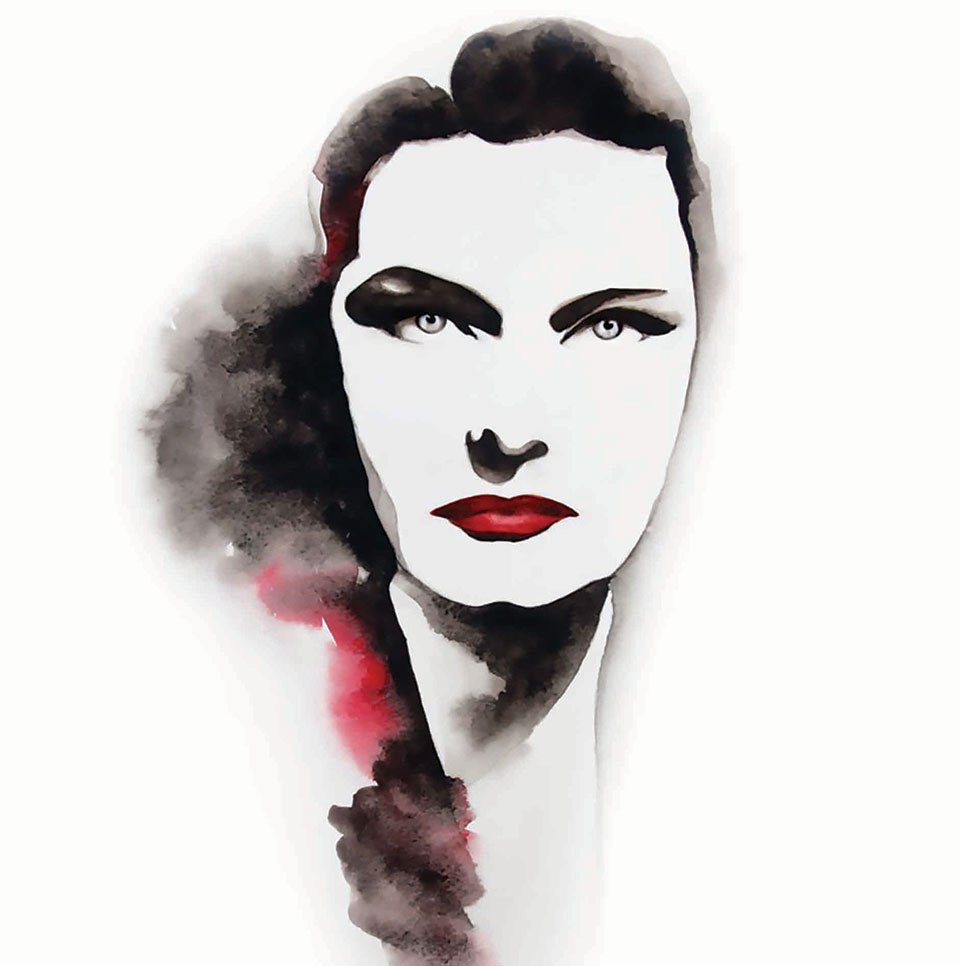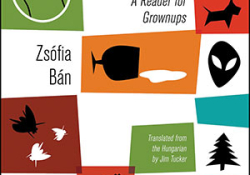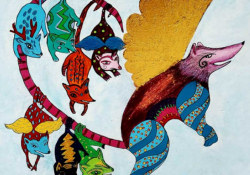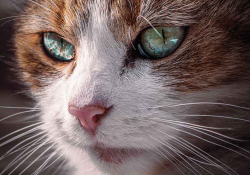Venom

In this story, Hungarian author Zsófia Bán writes into a little-known episode from Hungary’s tangled and traumatic pre–and post–World War II history, centered around film star and singer Katalin Karády. The iconic diva of the Horthy era was accused of spying in wartime, imprisoned, tortured, and banned on radio and in theaters in her home country in 1944; after her release, she saved Jews from certain execution on the Danube banks. Marginalized and banned from performing in the newfangled communist state, she entered permanent exile in 1951, spending several years in São Paulo, Brazil, never to act in a film or onstage again.
By dawn she was lying soaked under the sweaty sheet she used for a blanket. For weeks now she had been dreaming the same dream, exactly the same day after day, she took off her nightshirt because it would have stuck to her body like an unpleasant cold poultice. Not because it was so hot, she was lucky, her lodgings were on a plateau almost eight hundred meters above sea level, but not too far from the sea either, so she could still feel the salt in the air; the climate was pleasantly subtropical, one might say, for the state and within it, the City was cut in two by the Capricorn (“Aqui passa o Trópico de Capricórnio,” she read on a signpost on an outing) as though by a freshly sharpened machete. No complaints, K. thought as she was lying there in sweat, because the City that she kept calling so to herself, for she would only call by its name that other one at home, really did everything it could to take her in, wound its pulsating, strong body in a tight embrace around K’s wilting, decaying body like a sizeable cobra, a jibóia, a common boa constrictor, or on jollier days a colorful rainbow boa, it was pressing the air out of her slowly, gradually and every time its grip tightened a bit, she could hear the infamous boa belch, bafo do jibóia, she was lucky enough to hear it once at the serpentinarium, she now wished she hadn’t, a horrid sound, and on bad nights when suddenly she felt there was no air left in her lungs and no air left in the room, she started awake to this sound and to having had the same dream again.
•
To Brazil’s fair land, to Brazil’s far shore Katalin Karády did sail, for in Brazil’s sad tropics far ’twas her desire to dwell. In the deadly summer of fifty-three on a ship bound for the sad tropics she embarked; she dared not fly, fearing she would fall to her death, although—everybody to their own deaths, as the saying goes. Who are you and why are you come, Katalin Karády, the officer at Brazil’s gate asks—the Hungarians are then to lose the world championship in the deadly spring or summer of fifty-four, who’s at the gate, at the Hungarian gate?! sweet mother of mine, another goal, another Mohács. Profession-wise, I’m Karády, in José’s face so Karády says pertly, but upon uttering her name she sees with all too seeing eyes: her name falls from her mouth into the dust with a dull plop, right in front of the toes of José’s well-polished boots (senhor oficial, my officer, Sir! the tiny black shoe shiner shouts after him as he walks by the gate of the Port Authority offices, let me polish your boots till they glimmer like a mirror, so you can see to twist your moustache in them, who knows maybe today a beauteous senhora arrives on a ship, before whom you have to appear shipshape, you are always shipshape of course, don’t get my words wrong, Sir! but if you twist your moustache into the bargain, you will be nothing short of flabbergasting, so said the cunning negrito and this flow of words José couldn’t possibly resist, so be it, Chico, I’m having a good day today, here’s my two boots, son, polish them till they shine like a mirror), José recalled, watching the word of this foreign woman fall into the dust, and as his glance brushed past the toe of his boots, he stealthily, furtivamente, twisted his moustache. Katalin Karády, her name’s flight together with José following, in wonderment looked down upon the dust of Brazil, what the heck (and as she looked down, tiny folds crinkled on the softening skin of her neck, among which the glittering sweat-drops sat like the diamonds on the ring she slipped into the pocket of another foggy little officer, another flap-footed lizard, in that snowy December on the Danube banks, come on, officer, do release these kids now, don’t be silly), Katalin Karády would have recalled, had not all these been completely irrelevant at the moment, and had she but seen those sweatdrops shining, sitting among the folds of her neck, lucky she didn’t, because this sight always brought the stealthy rippling of time to her mind, even as she gazed down on the ocean’s dark, foaming waves from the ocean liner’s deck terrace, always the same, the days spuming to the point of nausea and vomit. And as she watches her name convulsively stirring still in the dust, at once she sees it slowly slip out of itself and, leaving behind some shrunken, scaled skin on the beach, scurry off into the gushing jungle’s throbbing vulva. At this point, cut back, Katalin Karády and José slowly raise their eyes and look at each other. Oh my, they say almost in unison, que coisa!, and this instantly breaks the ice, Katalin Karády wearily laughs at José, at which José unwittingly brings his hand to his moustache and twists it, then without further ado stamps Katalin Karády’s passport. Bemvinda ao Brasil, he says in that voice slightly hoarse from years of smoking, and he bows military fashion, you could have surfed on his glossy pomaded hair, if I can ever be of service to you, he adds almost in a whisper, but at this moment Katalin Karády is already making her way toward the customs, oh don’t start this, she mutters to herself, you too, you’re a mere puppy, and taking the arm of Irmuska Frank, the two of them walk off giggling. But as sweet Katalin Karády there for the luggage waiting lingers, at once her legs and all her limbs awf’lly to shake commence, like a trembling leaf she does shake, till she can stand no more, and because there was no other commodity around, she plopped down on a patient armadillo’s armored back and there started sobbing so bitterly that Irmuska Frank could hardly bring her to her senses. What is wrong, what is wrong, sweet Katalin Karády, tell me why you weep so bitterly? May God’s thunderbolt from heav’n come down and strike the dust of the road, may in mighty fright my horses shy and pull back with a snort!, Katalin Karády cried, and poor Irmuska Frank took a mighty fright, opened her handbag, fished from it a lace-trimmed handkerchief with a monogram and ran with it to the birds’ water feeder to soak it, all the while hearing Katalin Karády’s wailing, Lo, come they are to me gently fetch and throw me in the ingle, my ashes soft, my ashes white with the quicklime to mingle! and the passengers descending from SS Maria Nostra watched the scene anxiously, what is to become of this poor woman, all the while thinking that they weren’t feeling too great either, with the ground undulating under everyone’s feet after so much seafaring, but at least they were not throwing a scene, they kept their countenance, after all, we are Europeans, unlike these folks here, frightened Irmuska Frank ran back out of breath, the soaked cool kerchief on her forehead to press, this calmed her down a bit and now she merely sighed, whispered to herself, Hark, coachman mine, faithful coachman mine, ye my eldest servant, quick the horses hitch, dally ye no more, pray take me to my husband . . . István, please tell them the Ball at the Savoy is on tomorrow, la Tangolita cannot go onstage toothless, my teeth, Irmuska, my teeth are falling out, please don’t hurt me please, and then Irma Frank laid her out on the armadillo’s scaled armor and sat down by her side, pulling Katalin Karády’s head gently in her lap. It’s all right, it’s all right, Katalin Karády, she said, fear not as long as you see me, and indeed in that moment a mighty big toucan flew to settle on her shoulder and with its thick, bright horny beak drank from Irma Frank’s hollow, bony sternal notch that collected the condensing drops of humidity like a tiny, cool basin.
But as sweet Katalin Karády there for the luggage waiting lingers, at once her legs and all her limbs awf’lly to shake commence, like a trembling leaf she does shake.
•
When she first saw them she couldn’t get enough of them, but however hard she tried she couldn’t understand the reason. She felt revulsion but still, every weekend when the hat salon was closed she found herself there again. The Butantan opened only at ten in the morning, but she was up early, filled with that unaccountable excitement that in all this foreign City one place alone could provoke in her. Not the sight of the beach at three-quarters of an hour’s trip, not the crowd and the traffic throbbing on the streets, not the syrupy madness of the carnival, not the oily-skinned men and women who so readily displayed their bodily selves, not the food, not the spices, not even the heavy scents or the cicadas’ maddening, incessant chirping, nothing could trigger in her such an intense expectation and such satisfaction like the thousand inhabitants of the Butantan snake zoo. Then she slowly realized it was her own revulsion she couldn’t get enough of. Of the fact that there existed a place that could plastically render her most hidden state of mind, the revulsion she felt from her own life, that staged it, so to say, with all the available means of theatricality, made it visible and palpable. But this revelation came much later.
Until then, however, she surrendered to this irresistible attraction or, one might say, passion even, which was otherwise so utterly lacking in her own life that if she had let this awareness take control over her, her body would no doubt have instantly grown into the vulcanite wall paved with dark violet amethyst crystals, or into the metamorphic minerals, serpentinites, migmatites, and pegmatites, which are the occurrence of emeralds, diamonds, chrysoberyls, brazilianites, aquamarines, agates, and other gemstones across the country. In one word, she would have turned to stone. But she had her own methods. Your kisses, your lips are treacherous, out of habit only they come my way, no desire dwells in you, so in me all hope has died away, only suffering rests with me. She was now the Communist spy, now the Jew-saving harlot, or ganz einfach, a rotten whore who should be fucked good and proper. They beat her and she was singing. To herself only of course, but still loud enough to divert attention from her flesh. The flesh is just flesh. I’ve grown tired of you, and wherever you look for comfort I don’t care anymore, upon my word I don’t. The flesh is just flesh. It pains us perhaps, but if part we must, let’s not part in tears, my love. The flesh is just flesh. The flesh is just flesh. Until you faint. But when exactly this happened—in this oppresive humidity it is not easy to get a clear sense of time, K. sighed, ten years would sometimes seem the time it takes for mountain ranges to fold from the earth, and in certain mornings in the bathroom she could almost feel on her skin that burning, stinging sensation emerging from her dreams. Whether all this occurred in her own life or somebody else’s, this she would have liked to know. The question seemed impossible to settle from there. But even here she came upon the solution at last, the one and only cure possible for her. The place that would guarantee survival. A preserving bladder hollow in the membrane of time.
Apart from her there were two or three regulars, a pimpled, lean teenage boy, an always impeccably dressed old gentleman with a walking stick, and a young man with his son, so the keepers would greet them by their names from afar.
The snakes lived in enormous cages behind bars, which was of course reassuring, even more, she almost felt something like gratification as she watched them in their captivity. Still, the greatest happiness was when she could touch them, and the Butantan Institute made this possible. At a certain time of day, a few hours after feeding time when the beasts had already digested the mice, toads, insects, and other delicacies they were given, the animal keepers took one or the other out of their cages and they could be held by the visitors. The keepers showed how snakes had to be taken by the head, how to open their mouths and check their fangs, how to find the venom gland, how you could wrap even the bigger specimens around you without putting yourself in peril, everything that was necessary for such an intimate get-together. They showed how venom was collected from the poisonous species—this was of course only done by the keepers—then explained how the serum was made on the spot, in the institute housed by the time-honored colonial palace next to the serpentinarium. Apart from her there were two or three regulars, a pimpled, lean teenage boy, an always impeccably dressed old gentleman with a walking stick, and a young man with his son, so the keepers would greet them by their names from afar. Bom dia, Dona K., qual será hoje? Jerónimo, the slightly limping mulatto keeper always asked, as if he were the madam of some high-class brothel. That is, which inmate K. wanted to get to know more intimately that day; it was the regulars’ privilege that they could choose. The teenage boy as a rule asked for the biggest nonvenomous snakes he could wrap around himself, the young father placed the little boy’s orders, who was mostly interested in pythons and rattlesnakes, but the old gentleman invariably asked for the selfsame snake, a not particularly big but extremely venomous black-and-white cobra (its label read: bothrops jararacussu ). Maybe this time the dog head boa, K. said last week after some thinking, because she liked the snake’s preternaturally vivid, jolly hue of green, but no, let it be the yellow anaconda rather, but no, not that, and K. laughed a little, and Jerónimo nodded sympathetically, it’s not an easy choice, is it, he asked, himself laughing, and at the sight of his healthy, flashing white teeth K. suddenly felt a slight punch in her stomach, well it isn’t indeed, there’s too much on offer, you know what, Jerónimo said, I’ll take out two for you, just for you, because you are so beautiful today, oh don’t be silly, K. said, you were not even born when I used to be beautiful, and there they were at the bars already.
They try to replicate the snakes’ natural habitat in the cages as far as possible, Jerónimo explained, because happy snakes produce the most venom. And the institute needs a lot for producing serum. Perhaps, K. mused, this is why she was so attracted to this place where they can reverse venom production, where they are able to extract medicine from a deathly substance, where ill finally turns into good, and it was as if the place itself were the architectural and gardening embodiment of this triumphal story. For the institute located in the City’s center was surrounded by a vast, well-kept botanical garden almost the size of a forest, impregnated with the delicate scents of the luxuriant vegetation. Some came here only for a breath of fresh air, to sit around on the benches reading, for a rendezvous or merely to enjoy the sun.
K. was waiting for the moment when, taking one specimen or another in her hand, she could relive that joyous surprise, because she had always imagined that the snake’s body was unpleasantly slimy and wet, and when the possibility of close contact first presented itself in the shape of a pretty coral snake, which Jerónimo wanted to wrap around K’s neck playfully, you could go to a ball dressed like that, he said, you would be the queen of the ball, a rainha do bailhe, but then, seeing K’s laughing resistance, he put it in her hand rather, and from that unexpected, dry coolness that her palm and fingertips felt on the scales a strange calm descended upon her. As if the touch itself had been some kind of therapeutic serum. This was the feeling she wanted to experience again and again, that she waited for all week long, good afternoon, ladies, what kind of hat do you have in mind exactly, que tipo de chapéu, an elegant evening one or one for daily use rather, and although she seemed to be dedicated to her new profession and the salon’s fame spread rapidly in the City, in fact, as she was ashamed to admit even to herself, what kept her alive the whole week was the thought that on Saturday and Sunday she could go among her kin at last, because she secretly kept calling them so, with a puzzling mixture of empathy, solidarity, and self-identification. And if sometimes a so-called compatriot of hers should happen to walk in her shop and, after sizing up the forty-something woman standing behind the counter, hesitantly spoke the selfsame sentences inquiring after her identity in their mother tongue, K. quickened her pace in that other, borrowed language and turned toward the shelves to take down a hat that would suit the client, decisively blocking any other channel of conversation.
On that day, as always, the old gentleman came in his light blue striped suit and the de rigueur bow tie, leaning on his walking stick, and when he reached the cages he respectfully greeted K. In his voice the chivalrousness toward beauty was mixed with some sense of camaraderie, as if the whim of fate had thrown the two of them in the same trench. I see today you are the earlier bird, he said smiling, and K. apologized, that it was only on account of the bus arriving earlier, sitting in which she was always amazed at the clumsy netting of the plastic string reaching everywhere in the passenger cabin, which you had to pull before getting off. As if you wanted to flush the toilet, K. thought on such occasions, and pulled heartily. You are even prettier than usual, the old gentleman complimented K., and she, as always, gently warded off his advances. Oh, nonsense. But she thanked him all the same. He was the only man whose overtures, in this form even, she would readily receive for the past ten years. He disappeared, died, was killed, was executed, such were the rumors about that other one she kept waiting for in that other city (or was it in her imagination?), and then at once K. felt how this venom injected into her started jellifying in her veins and how it gradually blocked her circulation and now, standing in front of the snake cages, a suitable instrument could have shown that in them oxygen was circulating only in a very narrow channel.
Rattling his keys from afar, Jerónimo was hurrying toward them, I’m coming, I’m coming, aren’t you impatient today, he called out affectionately, quickening his pace as far as his limping allowed. Five minutes after opening time the only regulars to be there already were K. and the old gentleman, the teenage boy was obviously still fast asleep after partying through the Friday night with his friends, and the father was perhaps still having breakfast with his young son and inquiring from the boy’s mom what time they needed to be back home for lunch. Well, who is going to be the lucky chosen one today? Jerónimo asked K., because the gentleman’s case was settled. Let it be the tiger cobra, K. said with unusual determination; the snake’s violet-yellow-black coloring was not in the least reminiscent of a tiger but rather of an ara parrot with a career change, and this always cheered her up. As it happens, it’s shedding right now, Jerónimo said, I’d suggest you just look at it today, my lady. Seeing K’s disappointment the gentleman said at once, you know what, if you’d like you can take Doris in your hand, at which K. turned to him, unbelieving. Would you really let me? she asked and sat down in front of the cages. Because the old man never let anyone take out the snake he called Doris. K. could barely believe her ears. You I would, the old man answered and reached out toward the cobra Jerónimo brought out in the meantime, come, Doris, greet the senhora.
The moment K. touched Doris’s dry, cool skin she felt calm penetrating her limbs. The old man was watching their duo, and you could tell from his eyes that he was satisfied with the sight. Taking courage from this K. decided to ask the question she had long wished to ask but was afraid of appearing intrusive, for she didn’t like being harrassed with superfluous questions either. Why do you always ask for this snake, for Doris? The old man tilted his head to the side for a moment, like one considering the form of the answer he was to give. Because of my wife, he said at last, and as K. was obviously waiting for further explanation, he added, this is the one that bit my wife, and I caught it, forced its mouth open with a stick as I was taught to, and brought it in, but had its fang removed. We were young and foolish, had no serum on us, we thought no harm could befall us because we were together. We had been married for two years, he said and stroked Doris’s rough, scaly body. Don’t cry, he said, looking up at K’s face, you are still alive, you see.
K. looked in the direction of the tiger cobra in embarrassment and saw it as it just slid out, as Jerónimo told her, of its horny skin grown old. And as she was watching this curious phenomenon, unable to decide whether she was repulsed or attracted by it, at once a phrase glided into her mind from some faraway recess of her childhood, see gal, easy as shitting in bed. If you say so, K. said, and with dry eyes returned Doris into the old man’s bony hands. Forgive me, I didn’t want to hurt you, he said, concerned, but K. shook her head, of course you didn’t, but now I have to go. She stood up, smoothed down the folds of her sleeveless, light-colored linen dress, said goodbye to them, and started toward the entrance. Dona K., Jerónimo called after her, don’t you want to choose another one? But K. was already vanishing at the bend of the alley lined with palm trees.
Translation from the Hungarian
By Erika Mihálycsa
Editorial note: “Méreg” was published in the volume Amikor még csak az állatok éltek (When there were only animals, 2012). The title story of this volume was published in English in Best European Fiction 2012 (Dalkey).














